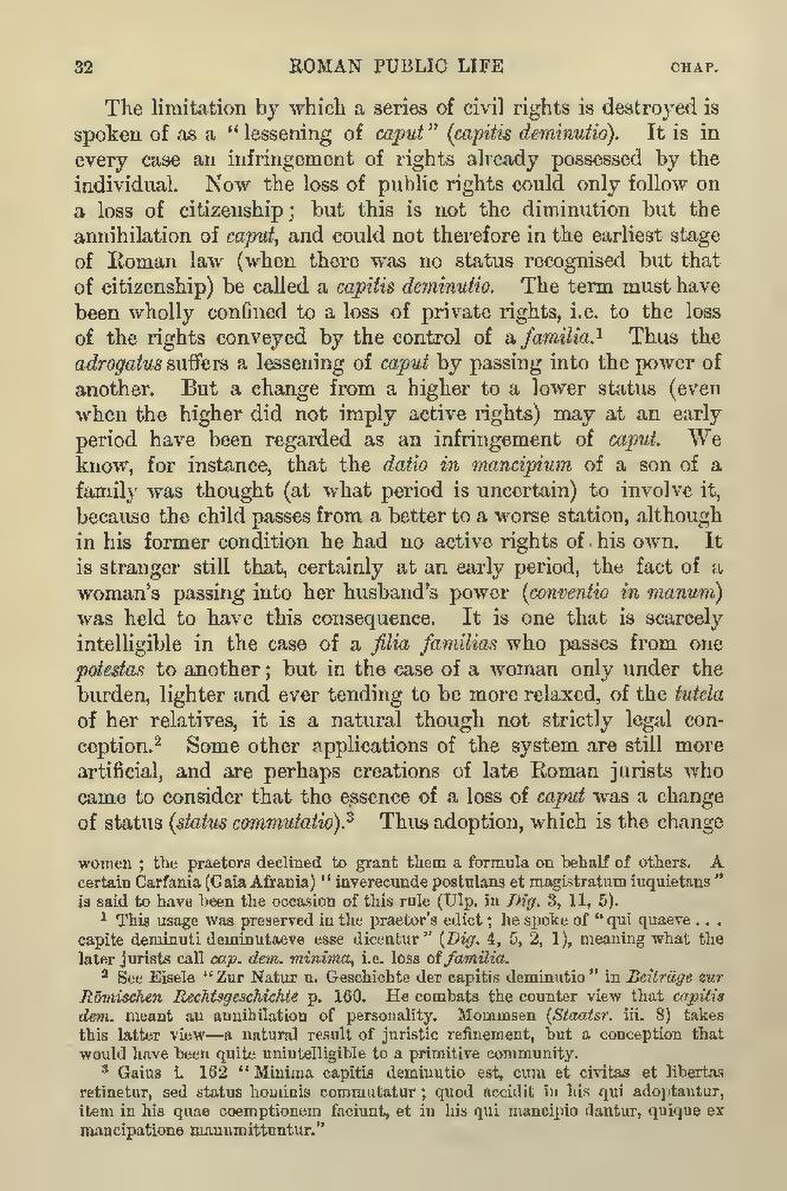The limitation by which a series of civil rights is destroyed is spoken of as a "lessening of caput" (capitis deminutio). It is in every case an infringement of rights already possessed by the individual. Now the loss of public rights could only follow on a loss of citizenship; but this is not the diminution but the annihilation of caput, and could not therefore in the earliest stage of Roman law (when there was no status recognised but that of citizenship) be called a capitis deminutio. The term must have been wholly confined to a loss of private rights, i.e. to the loss of the rights conveyed by the control of a familia.[1] Thus the adrogatus suffers a lessening of caput by passing into the power of another. But a change from a higher to a lower status (even when the higher did not imply active rights) may at an early period have been regarded as an infringement of caput. We know, for instance, that the datio in mancipium of a son of a family was thought (at what period is uncertain) to involve it, because the child passes from a better to a worse station, although in his former condition he had no active rights of his own. It is stranger still that, certainly at an early period, the fact of a woman's passing into her husband's power (conventio in manum) was held to have this consequence. It is one that is scarcely intelligible in the case of a filia familias who passes from one potestas to another; but in the case of a woman only under the burden, lighter and ever tending to be more relaxed, of the tutela of her relatives, it is a natural though not strictly legal conception.[2] Some other applications of the system are still more artificial, and are perhaps creations of late Roman jurists who came to consider that the essence of a loss of caput was a change of status (status commutatio).[3] Thus adoption, which is the change
- [Footnote: women; the praetors declined to grant them a formula on behalf of others. A
certain Carfania (Gaia Afrania) "inverecunde postulans et magistratum inquietans" is said to have been the occasion of this rule (Ulp. in Dig. 3, 11, 5).]
- ↑ This usage was preserved in the praetor's edict; he spoke of "qui quaeve . . . capite deminuti deminutaeve esse dicentur" (Dig. 4, 5, 2, 1), meaning what the later jurists call cap. dem. minima, i.e. loss of familia.
- ↑ See Eisele "Zur Natur u. Geschichte der capitis deminutio " in Beiträge zur Römischen Rechtsgeschichte p. 160. He combats the counter view that capitis dem. meant an annihilation of personality. Mommsen (Staatsr. iii. 8) takes this latter view—a natural result of juristic refinement, but a conception that would have been quite unintelligible to a primitive community.
- ↑ Gaius i. 162 "Minima capitis deminutio est, cum et civitas et libertas retinetur, sed status hominis commutator; quod accidit in his qui adoptantur, item in his quae coemptionem faciunt, et in his qui mancipio dantur, quique ex mancipatione manumittuntur."
